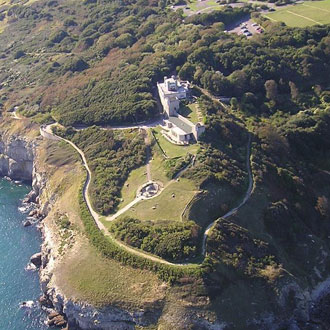Dorset Council’s Durlston Country Park is the first heritage attraction in Dorset to introduce a full set of accessibility products produced by Heritage Ability, a three-year project funded by the National Lottery Heritage Fund.
The Heritage Ability team worked closely with the staff at Durlston Country Park, to produce a set of accessible products that would help improve access to the park for disabled visitors and Deaf British Sign Language (BSL) users.
The products developed specifically for the park included four accessible guides, an all-terrain mobility scooter (Tramper) and the delivery of Disability Awareness training.
The four guides now available at the park use different techniques and formats, to aid understanding and meet the needs of certain visitor groups. These include:
·Easy Read Guide – created to help people with learning disabilities understand more complex information presented at the park. The guide is written using a simple ‘Easy Read’ format and supported with images to help clarify understanding. The guides also include activities and points of interest.
·Online Visual Guide – developed to enable those on the Autistic Spectrum and those with complex needs, plan their trip in advance, helping to reduce stress and anxiety on the day. This guide is available on Durlston’s website: https://www.durlston.co.uk/visit-access-for-all.aspx.
·British Sign Language (BSL) Tours – specifically for Deaf BSL users, consisting of a number of short film clips, created and presented by a volunteer BSL signer. These clips are then transferred onto a tablet, so Deaf visitors can walk around the park and use them at their own pace. They are also  uploaded to the Heritage Ability YouTube channel for viewing on personal devices. Deaf BSL users can borrow the tablet from the Visitor Reception at Durlston Country Park.
uploaded to the Heritage Ability YouTube channel for viewing on personal devices. Deaf BSL users can borrow the tablet from the Visitor Reception at Durlston Country Park.
·Large Print Guides – created for people with visual impairments, including conditions such as Macular Degeneration and Glaucoma. Large Print Guides use several techniques aimed at increasing the visibility of the information. The guide may also be of use for visitors who have dyslexia or where English is their second language.
Park staff and volunteers were also given Disability Awareness Training, to help them be more aware of the needs of disabled and Deaf BSL users visiting the park. The training included building awareness of the accessible products available on-site that can be offered to assist disabled visitors further.
The Heritage Ability project also funded an all-terrain mobility scooter (called a Tramper), to help visitors with permanent or temporary mobility issues see more of the park. The Tramper enables them to travel around and see areas previously inaccessible to them.
Ali Tuckey, Countryside Ranger from Durlston Country Park, said: “We are so excited to be the first site in Dorset to receive all of the products produced by Heritage Ability. Accessibility is so important to us, as we really want disabled visitors to get the most from their visit and really enjoy the park with their families and friends.”
Heritage Ability is in the final year of three-year funding by the National Lottery Heritage Fund, to support over 20 heritage attractions become more accessible across the South West.
The Heritage Ability project is managed by Living Options Devon, a user-led charity, where all of the initiatives are developed or supported by people who have a first-hand understanding of the challenges faced by disabled and Deaf people.
Heather Brown, Deputy CEO of Living Options Devon, stated: “It’s really fantastic that Durlston has now introduced all the accessibility products we helped develop with them. These products are already proving to make a huge difference to the lives of disabled visitors and Deaf BSL users.
“We hope to continue to work closely with the team at Durlston, to ensure more people are aware of the tools available, which can really help improve the visitor experience for disabled people and Deaf BSL users.”


